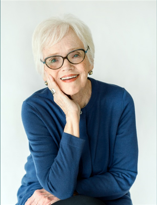Dr. Carolyn Lee reflects on a different cliché each week. Recently, in her blog, Beyond My Wildest Dreams,” she discusses the magic of traveling. This week Carolyn explores the cliché, If Truth Be Told.
Learn more about Dr. Carolyn Lee on her biography page or investigate 29 more clichés in her latest book, Keep Your Eye on the Ball And Other Clichès to Live by.
If Truth Be Told
Years ago, there was a celebrity game show called “Tattletales” on television. I don’t remember much about it except that it involved celebrities answering questions about their personal lives. On one episode, Bert Convey, the host, asked a panel of guest celebrities to answer this question: “Are you more or less confident than you appear to be?” Every one of them said, without hesitation, “less.”
Yes, if the truth be told, most of us would probably reveal that much of the confidence we hope to project is at least partly fabrication. We would prefer people not know about our insecurities and self-doubt; those are not very attractive qualities. And yet, when I learned that all those celebrities, people who had achieved success as entertainers and performers, were not as confident and secure as I thought they were, and they were honest enough to say so, I felt a certain kinship with them. They seemed more human, somehow, than they had a half hour earlier. I saw the point and the power of self-disclosure.
Not long after that Tattletales incident, I came across a little paperback book by John Powell entitled Why Am I Afraid to Tell You Who I Am? I was teaching Interpersonal Communication at the time, and this book became the bible out of which I preached the gospel of candid communication. Powell talked about the five levels at which communication can exist, beginning with what he called “Cliché Conversation.” At that level there is little exchange of any consequence. Then the levels move through the reporting of facts, the sharing of ideas and judgements, and the sharing of feelings and emotions. Finally, they reach what the author calls “Peak Communication,” a stage at which the participants engage in “absolute openness and honesty.” He suggested that, at this peak level, there should be moments when the encounter reaches “perfect communication.”
Now it’s time for some self-disclosure on my part. I first read Powell’s book in 1975. During the forty-five years that have elapsed since then, I have never reached the level of “perfect communication” with anybody. What’s more, I’m not sure I even believe in “absolute honesty.” Selective, compassionate honesty, yes; absolute honesty, maybe not.
I once did an exercise in a communication class that involved people working with partners and attempting to be completely open with each other. After about fifteen minutes, one of the young women in the class burst into tears and left the room. I looked at the guy who had been her partner, and he said, with a puzzled look on his face, “Well, you said to be absolutely honest.”
“Saying it like it is” and honestly revealing our true feelings can be a component of a strong and lasting relationship. Saying it like it is and being “brutally honest” can be a devastating deal-breaker. When I say, “selective honesty,” I mean honesty shared with the right person at the right time under the right circumstances for the right reasons. Indiscriminate, across-the-board sharing and self-disclosure can leave the receiver/hearer in tears or clamping her hands over her ears and yelling “TMI!!” Making decisions about what to share and with whom to share it requires a kind of maturity and selflessness that are hard to access. Sometimes it is tempting to pour out our pent-up grievances or complaints or hurt feelings in the name of honesty, but, as it turns out, that is seldom a good idea.
On a shelf in my study I have a big, fat book entitled The New Dictionary of Thoughts, a Cyclopedia of Quotations. I used to read it like a novel and underline all the quotations I found particularly insightful. Here’s one I underlined years ago and have thought of many times since: “We have no more right to put our discordant states of mind into the lives of those around us and rob them of their sunshine and brightness than we have to enter their houses and steal their silverware.”
If “Perfect communication” exists at all, it is rare and elusive, and it is unrealistic to think we are going to achieve it with significant numbers of family members and friends, even those whom we label “close.”
It seems to me that there is a place for all levels of communication, even the one that John Powell labeled “cliché.” Cliché communication is a place to begin with complete strangers. From there we can experience increasingly meaningful exchanges, and, on some occasions, with special people, we can strive for levels that involve the honest sharing of thoughts and feelings.
I have been thinking about, writing about, and teaching principles of communication all my professional life. When I speak about those principles from the front of the room or write about them for publication, I do so as a confident professional. As confident as I appear to be? Maybe not quite.
Want to Read More?
Check out Dr. Carolyn Lee’s blogs on her website, she features a new cliché each week or you can order her new book, Keep Your Eye on the Ball And Other Clichès to Live By. Curious about the author? Read more about Carolyn here. We hope you enjoyed this article learning more about the cliché, If Truth Be Told.













I found both books on Amazon! Thanks so much for the great suggestions!